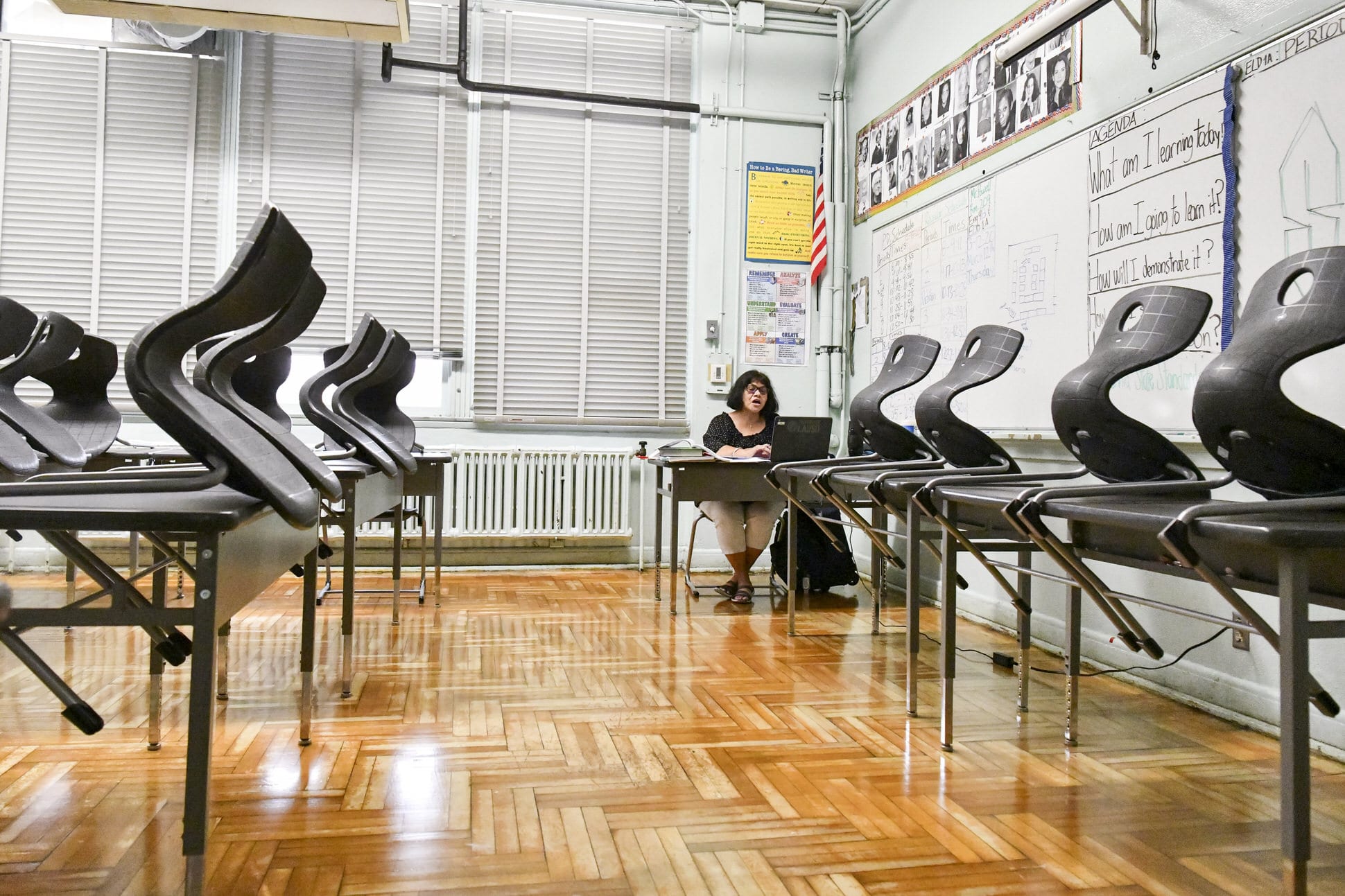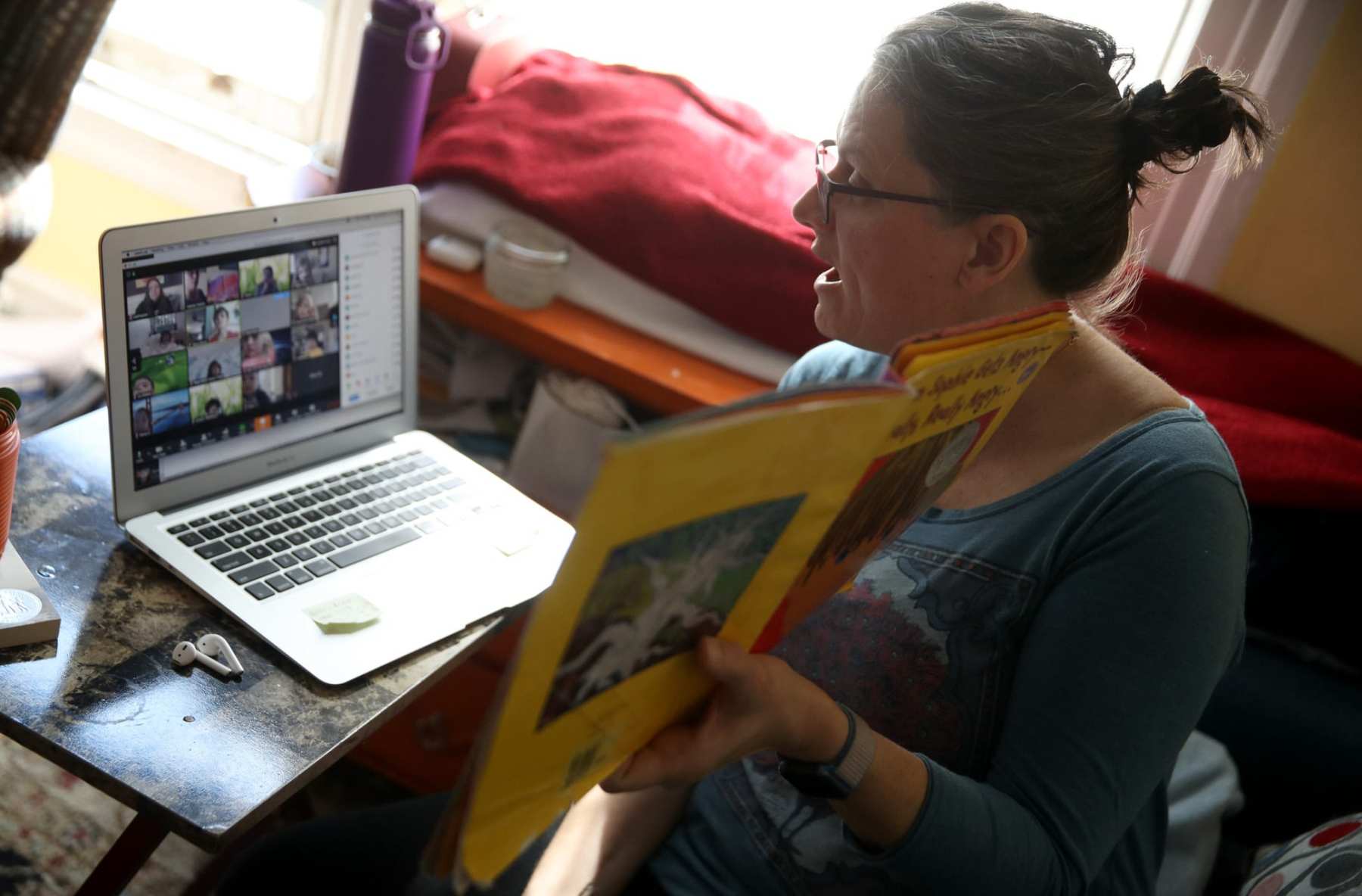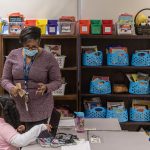Carly Evans never missed her weekly appointment with her therapist. She called it her “maintenance” — it kept everything in her life running smoothly.
That changed in September, when Evans, a high school English and drama teacher and mother of three, found herself juggling an impossible burden: educating students in a pandemic while stewarding her own family through the crisis.
“I wish I could say, ‘I’m handling it so well and am on it everyday,’” she said. “I’m not.”
Evans’ district in Sudbury, Massachusetts, has been operating since September on a “hybrid model” of teaching, so she splits her time between working on campus and remotely from home. Her two youngest children, who are in second and third grade, need adult supervision with their own online schooling, a responsibility she splits with her mother, who lives with the family. (Evans’ husband, also a teacher, has to show up in-person for his job at a private school.)
Evans, 42, keeps a color-coded daily schedule of every task she needs to complete to make sure that nothing falls through the cracks. But, of course, things do. And top of the list? Taking care of herself.
Since September, Evans said, she’s cancelled more therapist appointments than she’s kept. With everything going on, she said, “it’s that much harder to justify giving myself that hour every week.”
She isn’t sleeping. Before the pandemic, she suffered migraines every few months and called in sick on those days. Now, she has one per week, an increase she attributes to stress. She makes herself work through the pain — there aren’t enough substitute teachers to go around, and already, she said, “I have so little time” with her students. She’s exhausted, she said, but she has to keep going.
“You power through and do what you’ve got to do,” she said. “I keep telling my own children this is temporary. It doesn’t feel like it, but it is.”
Since summer, experts have warned that the mental health of the nation’s teachers — a category dominated 3 to 1 by women — could suffer when school resumed. That prediction appears to be bearing out. Many say their psychological well-being is suffering in ways they’ve hardly ever experienced.
Because of the pandemic, about three-fourths of the 100 largest school districts opted for complete remote learning, an October study found, and a little over a quarter of all districts began the year with a hybrid approach. But as COVID-19 case counts climb, districts across the country have ricocheted from remote to in-person to hybrid models, and many that started with even a semblance of in-person learning have fallen back to remote education.
Between the unpredictability, the isolation and the newfound challenges in reaching their students — who mental health experts worry are also struggling — what little mental health support is extended to teachers feels like nowhere near enough.
“I spend all day staring at a screen and kind of generating enthusiasm into the void that Zoom is, and I end the day so tired, and so done, and so frustrated,” said Emma Wohl, a middle school teacher in Washington state whose district has been completely remote this year. “The moments of joy I used to have are so much more rare.”
Last August, the National Education Association, a major teachers union, found that 28 percent of educators said the pandemic made them more likely to leave teaching. A study from Louisiana tracked early childhood educators’ mental health last spring, finding that rates of depression almost doubled, with more than a third of those educators indicating depressive symptoms. In a survey run from August to September by the National Board for Professional Teaching Standards, the vast majority of teachers reported working longer hours, and only a quarter said their school offered adequate support for mental health.
Still, there is precious little data tracking depression or anxiety among teachers, especially over the past few months, meaning there’s no clear picture of just how educators are faring in the wake of this year’s teaching experiment. Experts say all signs point to a crisis on par with the kind of trauma experienced after national disasters.
“I saw that kind of level of strain and stress because of natural disasters creating havoc. I saw it after 9/11 in New York City. You see it after crises,” said Randi Weingarten, president of the American Federation of Teachers, describing what she has heard from members of her union. “The only time we’ve seen it on a sustained level like this is obviously when you had a war.”
Research shows that high-stress situations can trigger symptoms of both anxiety and depression. Already, women were at greater risk for both conditions. As of the end of November, about 48 percent of all women exhibited symptoms of one such condition, an increase of 8 percentage points from this April and above what is normally seen, according to data collected by the federal Centers for Disease Control and Prevention. About 37 percent of men reported the same.
“Teachers have reached out to me and said, ‘For the first time in my life I have to see a therapist,’” said Amy Bintliff, an assistant teaching professor at UCLA, who has been trying to track teacher mental health since the pandemic began.
But therapists covered by teachers’ insurances may not have evening hours, and they don’t necessarily have the time — or spare money — for weekly appointments.
“There are access issues to mental health services,” Bintliff said.
It’s a theme that has emerged repeatedly since March, said Laura Wangsness Willemsen and Elisheva Cohen, two researchers who have been tracking teachers since the coronavirus crisis began, focusing on a cohort of elementary school teachers in Minnesota. Their research didn’t initially focus on mental health, they said, until teachers kept bringing up the topic on their own.
The level of stress isn’t sustainable, they said. Teachers have been operating in crisis mode since spring. By now, any surge of energy that fueled them through the pandemic’s initial months has been depleted.
“We see a deeper exhaustion going into the school year, and that hasn’t resolved,” Wangsness Willemsen said.
The sources of stress and fatigue are complex. Many teachers have had to switch back and forth between in-person and online learning, often with only a few days’ notice.
Evans said she has heard as late as Saturday that a recent student exposure to COVID means her Monday lesson is switching from in-person to virtual. She used to plan her lessons out a month in advance, but now gives herself only a week at a time. It’s simply not worth the chance that she may have to change things at the last minute.
Teaching from home is also a fundamentally different exercise, one that is simultaneously more invasive but also lonelier. Students on Zoom lessons often have their cameras off and microphones muted, making it harder to engage or connect with them. Normally, teachers can rely on their colleagues for consistent emotional support in quick lunch room chats. That sort of spontaneous support isn’t an option right now.
The challenges are greater for mothers. Research has shown that in many families, moms are more often the ones supervising a child’s virtual education. Teachers experience that dynamic two times over — instructing their students virtually while also working as the primary parent to ensure that their own children don’t fall behind in their own distance learning.

“Every mom I know is holding all of the weight,” said Erin Herda, a middle school ethnic studies teacher and mother of two in Washington state. “I’m still the one monitoring all [my daughter’s] online dance classes, and then having to throw tantrums to get other people to do chores. That definitely impacts my mental health, and my children’s, when I have to throw tantrums.”
Herda’s younger daughter, who is 8, frequently comes to her for help with assignments — often while Herda is in the middle of a Zoom session with her own students. “We’ve had to learn how to work with accepting those moments, and just say this is what it means to be working from home,” she said.
And all the while, many teachers carry the knowledge that their students — who often rely on in-person school for meals or for social support — are struggling, too. Research has shown that teachers’ mental health declines when their students are doing poorly.
Districts and teachers unions have put forth benefits and programs meant to help support teachers’ psychological well-being. American Federation of Teachers launched a “trauma benefit” this year, which includes counseling for teachers who have experienced events including “infection by contagious disease” or “major disaster.” There are mental health webinars, wellness town halls and even online yoga.
In practice, though, it’s all scratching at the surface. The trauma benefit has been used by some teachers, Weingarten said, but not as much as she had hoped, which she attributes to stigma against recognizing mental health problems and a lack of awareness that the resource exists.
For teachers who are stretched thin, those kinds of offerings provide little recourse. They require time and energy, which are in short supply.
“I don’t want to go to a webinar to think about my mental health,” Wohl said. “In my [school] building people try to organize a get-together after school, but it’s over Zoom, and I’m done with Zoom for the day.”
Other resources that might once have been available, and that could have provided some relief — calling in sick, for instance, if a teacher is feeling physically ill or needs a mental health day — are no longer tenable, teachers said.
In many districts, there simply aren’t enough substitute teachers to meet the need. Substitutes are typically retired teachers, and for districts using any hybrid or in-person model, the risk of coronavirus exposure poses a heightened threat. And especially in a pandemic that is straining everyone’s mental health, teachers said, the chance to actually see one’s students is too precious to abandon.
“These kids, they only get to come so much of the time, and they want to see me. They don’t want to see a sub,” Evans said.
For schools that are remote, getting a substitute set up for online learning poses its own set of logistical challenges — getting a Zoom, transferring it over, making sure the substitute is comfortable navigating online learning software. For many, that burden factors in when determining whether to call in sick.
Herda took one day off in October, and “it was more stress than imaginable,” she said. Her district still hasn’t developed a clear system for arranging substitute teachers over video-chat. So she had to alert human resources, tech support and her principal a week in advance of her absence. And still, she was fielding questions from the school on her supposed day away.
With that in mind, she said, the idea of taking a day off for mental health is difficult to conceive.
“I don’t feel confident there’s any measures in place that would help make sure my students shave anything guaranteed to help them, that would take the pressure off of me,” she said. “It would still rely on me doing all of the work even if I was very sick.”
Meanwhile, federal support has lagged. Outlining his own health agenda, President-elect Joe Biden vowed to make it safe for schools to reopen by the end of his first 100 days in office — assuming that Congress and state and local governments took measures to support school-teachers, and to curb the coronavirus spread.
But those are tremendous assumptions, and only promise a safe return to the classroom when the school year has almost ended. News of a vaccine could offer some hope that, even if things are bad now, they will eventually improve. A top CDC panel, the Advisory Committee on Immunization Practices, has recommended that teachers be part of the next wave of Americans vaccinated, meaning they could be immunized by some time in February.
But for many, it feels too far away to really make a difference, especially as winter looms.
“It’s like that trauma response where you cannot look forward. You just live day to day,” Herda said. “That’s the way I’m making it through.”







